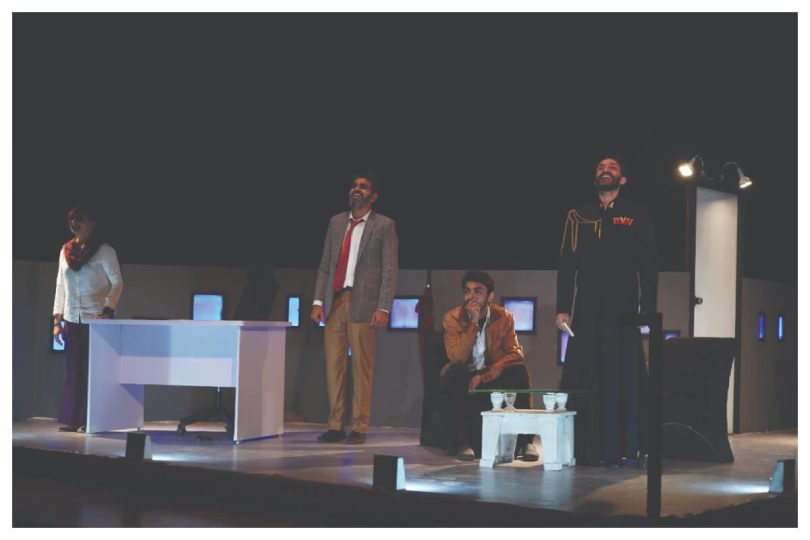You may have seen films or TV dramas that require a second viewing, because of the complex nature of their plot. Theatre plays aren’t different and Sunil Shankar’s Reader is one of those plays which are not easily understood because of their twists and turns. Maybe that’s why the NAPA management has decided to give it a run till 27th November (today), so that those audiences who couldn’t grasp it at first would be able to do it before it’s too late. Thankfully, it’s entertaining otherwise the audience would have been bored to death, had it tried to be more preachy than the final version.
The Plot
The play revolves around a censor (Fawad Khan) who finds out that somebody out there knows his secret and is trying to pen it down in the form of a novel. He has the power to ban it but decides against it because if he censures it, it might have an adverse effect on his son’s well-being, who is friends with the author. With the Director (Osama Tahir) monitoring his every move, the censor tries to hunt down the author and ask him how he got the information that is not known to many before it’s too late for both him and his son (Hassan Raza).
The Good
It wouldn’t be incorrect to say that Sunil Shankar’s play is an amalgamation of George Orwell’s 1984, and the TV show A Handmaid’s Tale and takes place in multiple timelines with which the audience is familiar, thanks to the Marvel Cinematic Universe. The stage is designed intelligently, breaking it into multiple timelines, so that the audience doesn’t get lost in transition, literally. Each and every actor does a brilliant job, especially Fawad Khan who was at home as both the characters he played, one with a limp, the other without it. It was his show from the word go and had he not been brilliant as usual, many might have left the theatre, dazed, confused, and bored.

There are many layers to the story, which one peeled reveal that not all is well with the perfect household, where the father is in love with someone at work while the son is in search of the truth about his mother’s demise. Things turn for the worst when the son finds out that there is more to the death of his mother (Kulsoom Aftab) and that his father is somehow responsible. How Hassan Raza, the actor playing the character, reacts to the information is something only a talented individual would have been able to pull off, and he does so with flying colors.
Supporting actors like Bazelah Mustafa as the mistress, Naveed Kamal as the friend, and Osama Tahir as the Director do their jobs well and keep the audience glued to their seats, with their superlative performances. The way the characters go from one timeline to another, and then back to the first one is also what doesn’t bore the audience who wants to find out the truth, just like the protagonist. Moving the stage may not be a new phenomenon for the theatre but the way it has been used here doesn’t disappoint the audience who seem to wonder when the next time the stage will move and the timeline will change.
The Bad
In a world where the attention span of the audience is shrinking with every passing day, directors should realize that a play of more than 90 minutes is not what the audience needs. Had the runtime of Reader been less than 90 minutes, it would have done wonders for the audience but it exceeds two hours. People including this scribe were perplexed by the story but were also checking their watches, which isn’t a good sign. Too much was happening in too little time, which didn’t help the drama at all, since the audience was wondering which timeline they were in, half of the time.

If the protagonist was in the second timeline, then what was the Director’s doppelganger doing in the same, or why was he even necessary in the first place? If some people reminded the censor of his family, how were they in the same timeline? And then there was the end which left more questions than answers and came out as shock than surprise. Unlike Hollywood films, the format of which they might have followed, a theatre play that lets the audience assume doesn’t do itself any favors, and had the end been a little simpler, it might have helped all those involved, the audience and those entertaining them.
The Verdict 3/5
Like Orwell’s masterpiece 1984, Reader revolves around the theme of fear, where everything is controlled by the government, from getting married to laughing without a reason, and of course reading what the government wants you to read. The play tells us that one way or the other, our lives are controlled by others, and only when the brave try to take a stand, luck favors them. But does luck appear too late in this play, that’s one of the questions the audience asks themselves once they are out of the theatre.
The social commentary this play mentions is something we Pakistanis are quite familiar with, however, the way it is mentioned could have been simplified. Involving the audience wasn’t needed, especially after the introduction of the magnificent set, and the same could be said of the mind-bending ways to make the attendees reflect on their lives. Trust me, they have bigger things to worry about and the complex conclusion was the last thing on their mind when they did get the chance to think about something. It wasn’t there on my list, and I wasn’t the only one who came out without a clue as to what happened in the end. For some reason, the plot of Shah Rukh Khan’s Om Shanti Om came into my mind as soon as I stepped into the real world, or maybe it was the revenge element that made me go in that direction.







